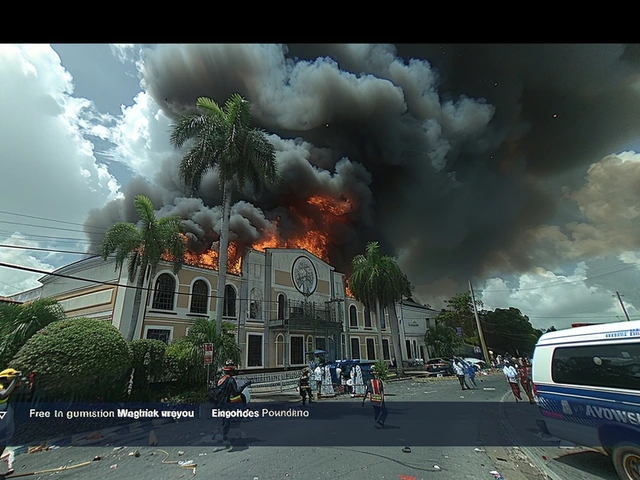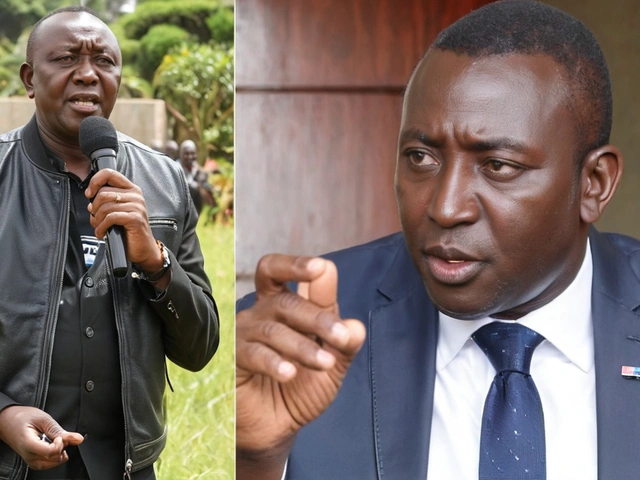World Environment Day 2024: Tackling Desertification and Drought
In 2024, World Environment Day will be hosted by Saudi Arabia, bringing the global spotlight onto the critical issues of land degradation, desertification, and drought. These environmental crises are not just geographically isolated concerns but worldwide threats impacting millions of lives and ecosystems. According to the United Nations, approximately 40% of the world's land is classified as degraded, a devastating statistic that underscores urgent need for action.
The seriousness of this issue is further highlighted by the increasing duration and severity of droughts. The UN has projected that by the year 2050, over 75% of the global population might be affected by droughts. The longevity and severity of droughts not only threaten water supplies but also have far-reaching consequences on agriculture, food security, and overall socio-economic stability.
Understanding the Causes
Dr. Iyad Abu Moghli, founder and director of the United Nations Environment Programme (UNEP) Faith for Earth Initiative, attributes land degradation largely to human activities. Deforestation, urban expansion, and unsustainable agricultural practices are among the primary culprits. These activities lead to soil erosion, loss of biodiversity, and significant disruption of local climates, creating a ripple effect that affects the environment on a broader scale.
One of the major contributing factors to land degradation is deforestation, where vast stretches of forested land are cleared either for the expansion of agricultural land or for urban development. Trees play an essential role in maintaining soil structure and fertility, hence their removal leads to soil erosion. Additionally, urbanization and industrial activities result in pollution and further deterioration of natural landscapes.
Mitigation Strategies
Experts like Dr. Abu Moghli emphasize that reversing land degradation is possible through targeted interventions. These strategies include reforestation, where degraded lands are planted with trees to stabilize the soil and restore biodiversity. Soil conservation practices, such as contour farming and the use of cover crops, are also crucial for maintaining land fertility and preventing erosion. Furthermore, effective water conservation methods, including rainwater harvesting and sustainable irrigation techniques, are essential in regions prone to drought.
Reforestation efforts have shown promising results in various parts of the world. For example, China's Great Green Wall project aims to combat desertification by planting a vast number of trees over thousands of kilometers. This initiative not only helps in stabilizing the soil but also provides new habitats for wildlife. Similarly, practices like agroforestry, which integrates trees into agricultural lands, offer both environmental and economic benefits to local communities.
Inspired by Pope Francis’ Laudato sì
In addressing the moral and ethical dimensions of environmental protection, Dr. Abu Moghli draws inspiration from Pope Francis' Encyclical Laudato sì, which calls for an 'ecological conversion' and a collective responsibility towards caring for our common home. This influential document emphasizes the interconnectedness of all life forms and promotes environmental stewardship beyond religious confines.
Pope Francis’ call to action has garnered global attention, encouraging people of all faiths and backgrounds to take responsibility for the environment. The encyclical advocates for a profound shift in attitudes and actions towards the natural world, urging humanity to adopt more sustainable lifestyles and policies. This ethical framework has inspired numerous environmental initiatives that cross religious and cultural boundaries, fostering a sense of global unity in the pursuit of environmental sustainability.
The Role of Faith Communities
Faith communities around the world play a significant role in environmental protection, drawing from teachings that emphasize stewardship of the Earth. Religious leaders and organizations have been pivotal in mobilizing grassroots movements aimed at combating land degradation and promoting sustainability. For instance, the Green Ramadan initiative encourages Muslims to adopt eco-friendly practices during the holy month of Ramadan, such as reducing food waste and conserving water.
Similarly, in Christianity, many churches have adopted 'Creation Care' programs that educate congregations on environmental issues and promote actions such as recycling, energy conservation, and supporting sustainable agriculture. These faith-based initiatives demonstrate that environmental stewardship is a shared value across different cultures and religions, highlighting the universal importance of protecting our planet.
Global Efforts and Collaborations
The fight against desertification and drought requires global collaboration and commitment. International organizations, governments, and local communities must work together to implement effective land management practices. Technical and financial support from developed countries can significantly aid developing nations in their efforts to restore degraded lands and build resilience against climate change.
Initiatives such as the United Nations Convention to Combat Desertification (UNCCD) provide a platform for global cooperation. The convention encourages sharing of knowledge, technologies, and best practices among member countries to address the multifaceted challenges of land degradation. Strengthening these international partnerships is crucial for achieving long-term success in combating desertification and drought.
The Way Forward
As we approach World Environment Day 2024, it is imperative to recognize the profound impact of land degradation and the escalating threat of droughts. The theme for this year serves as a powerful reminder of our collective responsibility to restore and protect our natural resources. By embracing sustainable practices, engaging communities, and drawing inspiration from ethical frameworks like Laudato sì, we can pave the way towards a more resilient and sustainable future.
While the challenges are significant, the solutions are within our reach. Through reforestation, soil and water conservation, and global collaboration, we can heal our degraded lands and build a world where both people and nature thrive. World Environment Day 2024 is not just an event but a call to action – a call that we must answer with urgency and commitment.







Comments
Deborah Canavan
June 7, 2024 AT 14:14 PMIt's wild how often we talk about desertification like it's some distant problem happening in faraway places, but the truth is the same patterns are showing up in places like the American Southwest, the Sahel, even parts of southern Europe. Soil doesn't care about borders. When you strip away the topsoil, whether it's for palm oil plantations or suburban sprawl, you're not just losing dirt-you're erasing generations of ecological memory. And honestly, the fact that we still treat land as a resource to be mined rather than a living system to be tended… it’s like we forgot how to be guests on this planet.
Reforestation helps, sure, but it’s not a band-aid for a gunshot wound. We need to stop incentivizing monocultures and start rewarding polycultures. We need to pay farmers to grow diversity, not just yield. And we need to stop pretending that tech fixes alone-like drip irrigation or genetically modified drought-resistant crops-are going to solve something that’s fundamentally a cultural and economic failure.
It’s not about being green. It’s about being sane.
And yeah, Laudato sì got it right. This isn’t a policy issue. It’s a spiritual crisis disguised as an environmental one.
Thomas Rosser
June 8, 2024 AT 01:51 AMlol the UN wants us to believe desertification is ‘human-caused’? 🤡
Have you seen the solar cycles lately? Or the fact that the Earth’s magnetic field is weakening? 🌍⚡
China’s Great Green Wall? That’s just a propaganda stunt to hide how they’re poisoning their own rivers with coal ash. And don’t get me started on ‘agroforestry’-it’s just corporate greenwashing with extra steps. Real solution? Let the land lie fallow for 50 years and stop pretending we can ‘manage’ nature. We’re not the admins of this planet. We’re the glitch.
Also, Pope Francis? Cute. But he’s never farmed a single acre. 🤷♂️
Joshua Johnston
June 9, 2024 AT 23:34 PMThomas, your comment is the kind of thing that makes people lose faith in the idea that facts matter. You’re not challenging the narrative-you’re just screaming into a void while wearing tin foil.
Look, I get it. The world is overwhelming. But pretending that desertification is a natural cycle ignores the fact that we’ve accelerated it 100x beyond any natural rate. The soil in the Midwest is vanishing faster than it can regenerate. The Colorado River is a trickle because we’ve turned it into a plumbing system for almonds and lawns.
It’s not about blaming individuals. It’s about recognizing systems. And systems can be changed. We did it with ozone. We can do it here. We just have to stop treating ecological collapse like a political debate and start treating it like the emergency it is.
Also, the Pope’s message isn’t about farming. It’s about humility. Maybe try reading the actual encyclical instead of the Reddit summary.
Kerry Keane
June 11, 2024 AT 10:42 AMi just saw a video of a farmer in texas planting trees with his grandkids and it made me cry for no reason honestly like we forget that soil is alive and we’re just borrowing it and one day we gotta give it back
Elliott martin
June 12, 2024 AT 09:42 AMDeborah you’re right about the spiritual crisis part
I’ve been thinking about this a lot lately-how we’ve separated ourselves from the land not just physically but emotionally. We don’t know where our food comes from anymore. We don’t touch dirt unless we’re gardening or cleaning up after a dog. We live in boxes with climate control and think that’s normal.
And the faith communities? They’re doing something important. Not because they’re holy, but because they’re communities. They’re places where people still gather around shared values. That’s rare. That’s powerful.
But what if we stopped calling it ‘environmentalism’ and just called it ‘living’? Like, what if we didn’t need a day to remind us to care for the earth because we just… did it? Like breathing?
Shelby Hale
June 13, 2024 AT 19:55 PMOh my GOD. The Pope. Again. 🙄
Of course the solution to ecological collapse is… more religion. Because nothing says ‘sustainable future’ like a man in a pointy hat telling people to feel guilty while sipping espresso in the Vatican.
Meanwhile, the real heroes are the Chinese engineers building solar-powered desalination plants in the Gobi Desert while the rest of us are out here debating whether ‘ecological conversion’ is a buzzword or a cult.
And let’s not forget the real villain: capitalism. Or maybe it’s democracy. Or maybe it’s the fact that we still use toilet paper made from trees. 🌲💩
I’m just saying-maybe we should all move to Mars. At least there, we’d have a clean slate. And no one to tell us we’re morally failing.
Also, I’m starting a cult. It’s called ‘No More Trees, Just Clouds.’
Join me. I’ll send you a PDF.